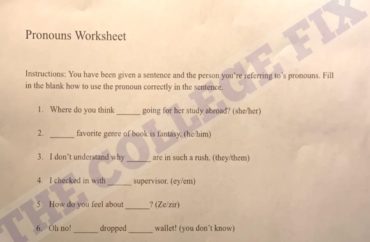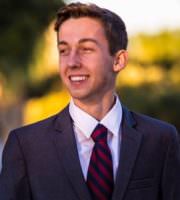
‘Beautiful people’ is also acceptable
San Diego State University held a “Pronouns 101” workshop on November 20 in honor of “Transgender Awareness Day.”
The event, hosted by Wesley Palau, coordinator of SDSU’s Pride Center, and Miles Reyes, part of the Pride Center’s media team, spent time teaching students how to use language that is inclusive of transgender people. It lasted for about half an hour and was sparsely attended.
The speakers started the presentation with a land acknowledgement of indigenous people.
After, students were advised not to use the word “guys” when addressing a group of people, and instead use terms such as “y’all” or “folks.” Another option suggested was “beautiful people.”
Next students engaged in an activity during which they were given various statements regarding pronouns and asked to raise their hands if they agreed or disagreed.
Some of the statements included:
“It is grammatically incorrect to refer to a single person as ‘they.’”
“It is ok to use whatever pronouns you think fits a person.”
The two speakers then provided a large excel-like picture of all the various pronouns a transgender person could have, which included sections for Spanish and indigenous languages.
“Some languages are more gender-neutral and are more able to incorporate gender-neutral pronouns in language, but when that’s not inherently in the system, we make it work…because [language] is meant to evolve,” Reyes said.
Students were also advised to always inform people of their pronouns when they are introducing themselves, even if they coincide with the gender they were born with.
“Referring to somebody with the wrong pronouns can make them feel just gross, it’s just disrespectful and it makes people feel invalid or invisible, and dismissed, alienated, dysphoric, and a bunch of unpleasant things,” Reyes said.
The audience was then given a “pronouns worksheet” on which they could fill in the blanks to various questions about the right types of pronouns to use in different situations.
Palau then went on to compare accidentally using the wrong pronouns to being stabbed with a knife.
“I remember when I was first starting to transition and people would misgender me…It kind of felt like being stabbed, you know, but at the same time you’re being stabbed and you’re hurt, but you have to turn around and tell the person, ‘Oh actually don’t use this knife, I know you wanted to use a pom-pom to massage me or something instead of the knife that they went for.’” Palau told the audience, “It’s like having to do the labor of the emotional work while you’re kind of wounded yourself.”
Later on in the presentation, the speakers noted that people are privileged if they use pronouns that align with society’s view of which pronouns should be assigned to them.
“It is a privilege to not have to worry about what pronouns you’re referred to as,” Reyes said.
They also encouraged those in attendance to correct someone if they hear that person using non-inclusive language, such as “hey guys.”
MORE: UMinnesota threatens faculty for ‘repeated misuse of pronouns’ in new policy
Like The College Fix on Facebook / Follow us on Twitter






Please join the conversation about our stories on Facebook, Twitter, Instagram, Reddit, MeWe, Rumble, Gab, Minds and Gettr.